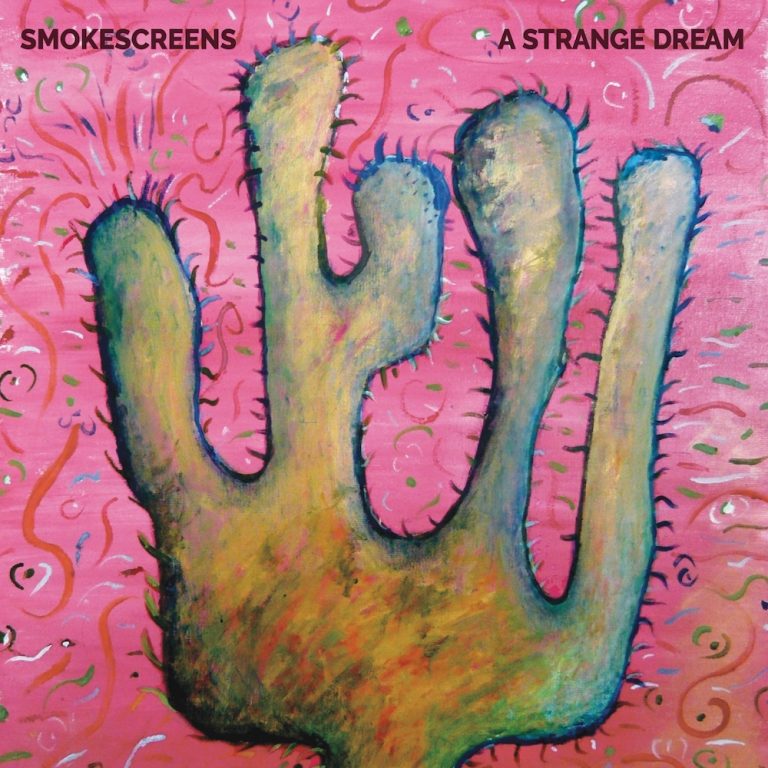That Los Angeles trio Smokeskreens titled their latest album A Strange Dream feels too perfect. For almost everyone, 2020 has felt surreal, if not nightmarish or apocalyptic. Even the efforts to poke fun at today’s absurdity are often undermined by the reality that nothing’s funny about it (a recent SNL episode, where Kate McKinnon breaks down mid-sketch for this very reason, may come to mind). In this regard, everyone’s learning to cope with the moment in different ways. Smokescreens are no exception.
Nevertheless, there is something dreamlike about A Strange Dream in that, on the surface, its key components seem at odds with each other, like recalling a dream whose details defy physics. On the one hand, the album is a nostalgia trip — the bright, jangling guitar work and Chris Rosi’s earnest yet catchy vocals on tracks like opener “Fork In The Road” and “On and On” evoke the wanderlust-driven strain of indie rock that runs from The Go-Betweens to Rolling Blackouts Coastal Fever. Given that bandmates Rosi and Corey Cunningham bonded over their love of bands on New Zealand label Flying Nun (home to The Bats and previously The Clean, among many others), these influences are a no-brainer. What’s more, David Kilgour of The Clean produced this album.
On the other hand, A Strange Dream is more than pure ear candy; if anything, Smokescreens’ melodies belie their otherwise sobering, sometimes hopeless, lyrics. Take the single “Working Title”, where Rosi sings “Tired overworked and broken down / I just want the world to stop spinning round.” “Fork In The Road” is a parable of sorts, where Rosi goes from youthful ambition (“You may say I’m overconfident or arrogant / I can’t help to think that I’m great”) to crippling indifference (“I came to a fork in the road and went straight / I went straight”).
Fortunately, Smokescreens also vary their approach a couple of times to minimize the risk of diminishing returns. The hazy dreamscape of the ballad “I Can Still See You” crosses into Britpop territory, and it’s the closest the band comes to the lo-fi aesthetic of their previous album Used to Yesterday. Meanwhile, album closer “I Love Only You” evokes the painful gentleness of Velvet Revolver; the lullaby piano keys and echoing percussion create what’s easily the most emotionally effective track on the album. Here, whether it’s existential dread (“When it’s all coming down), the daily grind (“When the routine bites you hard”), or internalized fear (“And you wake up and you’re in fear”), Rosi assures this lover that he’ll always be there.
Yet these are the exceptions: as a whole, the production of A Strange Dream helps delineate the album as a shift for Smokescreens. Kilgour and engineer Kyle Mullarky have helped create an album devoid of almost all excess, choosing instead to focus on the melodies that drive each song.
Speaking of a new direction: perhaps the most intriguing aspect of A Strange Dream is the political, working-class perspective also at work. In “Streets of Despair”, Rosi sings about a nameless person in their golden penthouse, observing all the societal ills they’ll never experience. By the final verse, listeners understand Rosi’s position: “People living with poor health / But the rich keep the wealth for themselves,” he sings over a syncopated rhythm that acts something like a proto-protest cry.
This is no coincidence: Smokescreens recognize that A Strange Dream is a more political album. “More” is an important qualifier; at just under a half-hour, the album doesn’t break new ground politically, and the songs themselves are too friendly to be threatening, but that also feels besides the point. Like a dream, the band is still processing the troubles of the day, identifying its ills but still unsure of how to act. They’re learning to cope.

